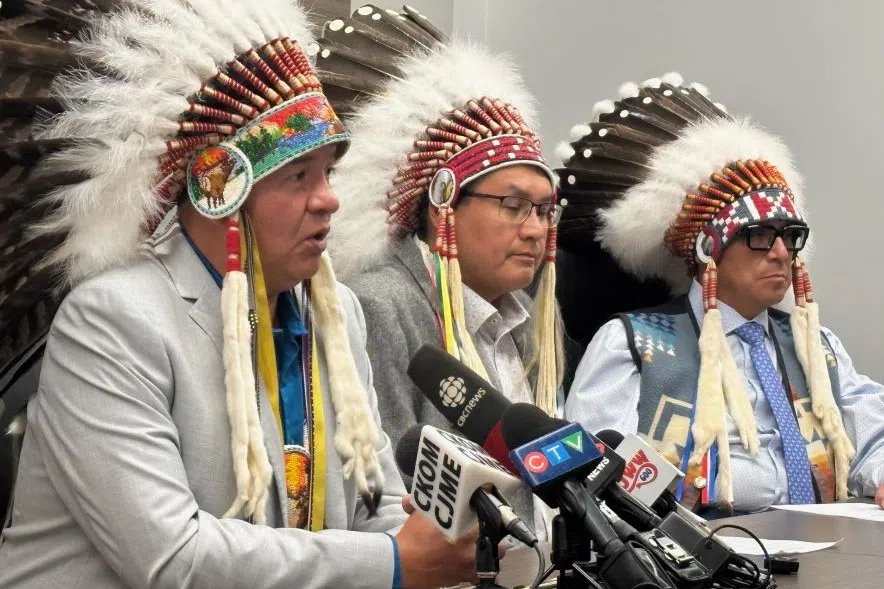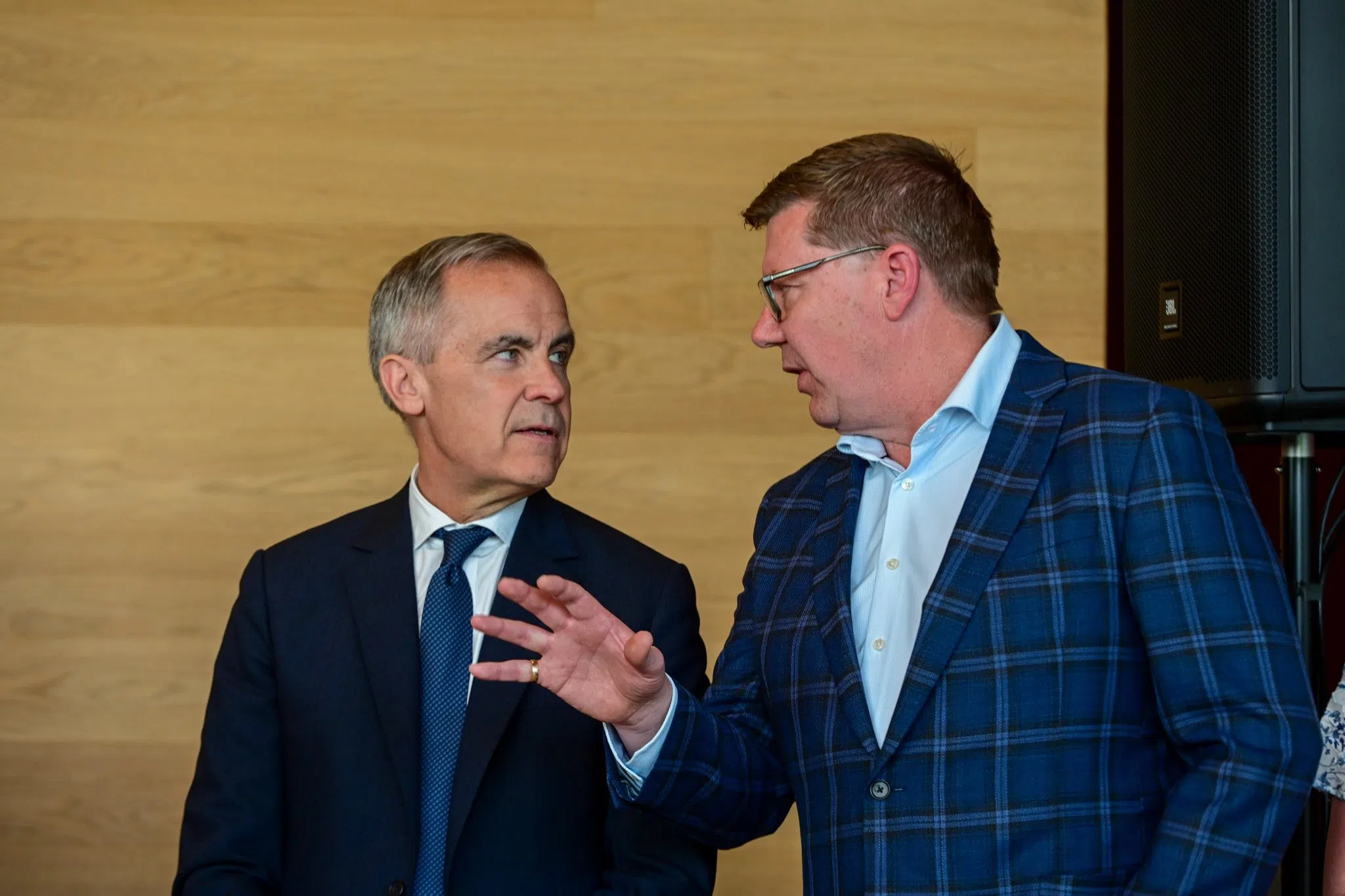SASKATOON — Canada’s premiers are meeting with Prime Minister Mark Carney in person for the first time since the federal election to pitch which major projects they think should get fast-tracked.
The recent campaign saw Carney vow to slash federal approval times on major infrastructure projects considered to be in the national interest to help make the country an “energy superpower.”
Read More:
- Ports, mines and pipelines top premiers’ wish lists ahead of meeting with Carney
- Saskatchewan, Ontario premiers sign MOU to remove trade barriers
- Cool temperatures, chance of rain as crews battle wildfires near Flin Flon, Man.
Premier Scott Moe said he’s been clear in the interest Saskatchewan has in doing its part to make sure Canada achieves Carney’s goals — however, he reiterated that being an energy superpower means all forms of energy, including oil and gas.
The full list of big industrial projects they’re discussing is being kept secret, since they don’t want to send a bad signal about anything that doesn’t make the short list.
But Ontario Premier Doug Ford says his pick is the Ring of Fire mining project in northern Ontario, while Alberta Premier Danielle Smith says she wants to see the Port of Prince Rupert become a major trade corridor.
Moe said there are two conversations to be had, one about improving the regulatory environment to attract private investments to these large projects. He said the second piece is public infrastructure.
It was my pleasure today to welcome Prime Minister Carney, and Premiers from across this great country to our beautiful city of Saskatoon.
This is the first time in 40 years that the First Ministers’ Meeting is being held in Saskatchewan.
Today, we are having important… pic.twitter.com/TWGsDl6NcO
— Scott Moe (@PremierScottMoe) June 2, 2025
“I think that is almost a separate conversation with respect to how we are going to join as a provincial government with the federal government and, oftentimes municipalities, on publicly funded infrastructure that is going to provide the services that, at the end of the day, Canadians expect their government to work together on,” said Moe.
Moe and the other Western and Northern premiers spoke about the possibility of a trade corridor stretching across Western Canada, from the Port of Churchill to northern B.C., at the Western Premiers Meeting. Moe brought that up again on Monday morning as an example of where many of the premiers are already working together.
“That would be absolutely imperative and an opportunity for not only those in Western Canada but for all Canadians to access those Asian and European markets,” said Moe.
The project had been mentioned by a few premiers ahead of the meeting as a possible project to bring up.
The first ministers are also expected to discuss breaking down interprovincial trade barriers, which would make it easier to purchase Canadian-made goods from other provinces and territories.
Many provinces, including Quebec and Ontario, are coming to the table with legislation already put forward that would eliminate some of these longstanding blocks to internal trade.

FSIN Chief Bobby Cameron also pointed out that his organization has filed a statement of claim against both the federal and provincial governments, alleging the Natural Resources Transfer Agreement (NRTA) signed in 1930 was both unlawful and illegal. L to R: FSIN Chief Bobby Cameron, Vice Chief Fabian Head, Vice Chief Dave Pratt. (Lara Fominoff/650 CKOM)
First Nations chiefs upset they’ve been excluded from the premier’s meeting
Eleven Saskatchewan First Nations chiefs say they’re upset and concerned that they’ve collectively been left out of the discussions during the First Ministers’ meetings in Saskatoon.
According to the Federation of Sovereign Indigenous Nations (FSIN) Vice Chief Dutch (Edward) Lerat, the exclusion represents a fundamental breach of the federal government’s constitutional obligations.
“The agenda items for the First Ministers’ meeting here in Saskatoon are internal trade, tariffs, pipelines, and major projects. These are all critical matters that directly impact our inherent treaty rights and constitutional rights, including rights to our lands, waters, medicines, and all living things,” he said.
He said no one can deny the resources and critical minerals that are or will be extracted are from treaty and traditional lands.
“So, let’s be clear: any conversation about internal trade, tariffs, pipelines, or major projects must include our First Nations,” he added.
FSIN Vice Chief Craig McCallum said collectively that they’re not against development.
“We are for the protection of our lands, our sovereignty, and our right to determine our future, and that is up to our nations,” he said.
Other chiefs added that the wealth generated from resource development would should benefit everyone, including First Nations., and that while Prime Minister Mark Carney and the country’s premiers have been consistently speaking out against the way U.S. President Donald Trump has treated Canada, they feel as though Canada has treated them in the same manner.
FSIN Chief Bobby Cameron also pointed out that his organization has filed a statement of claim against both the federal and provincial governments, alleging the Natural Resources Transfer Agreement (NRTA) signed in 1930 was both unlawful and illegal.
— With files from Rob Drinkwater in Edmonton and 650 CKOM’s Lara Fominoff
This report by The Canadian Press was first published June 2, 2025.
Kyle Duggan, The Canadian Press











